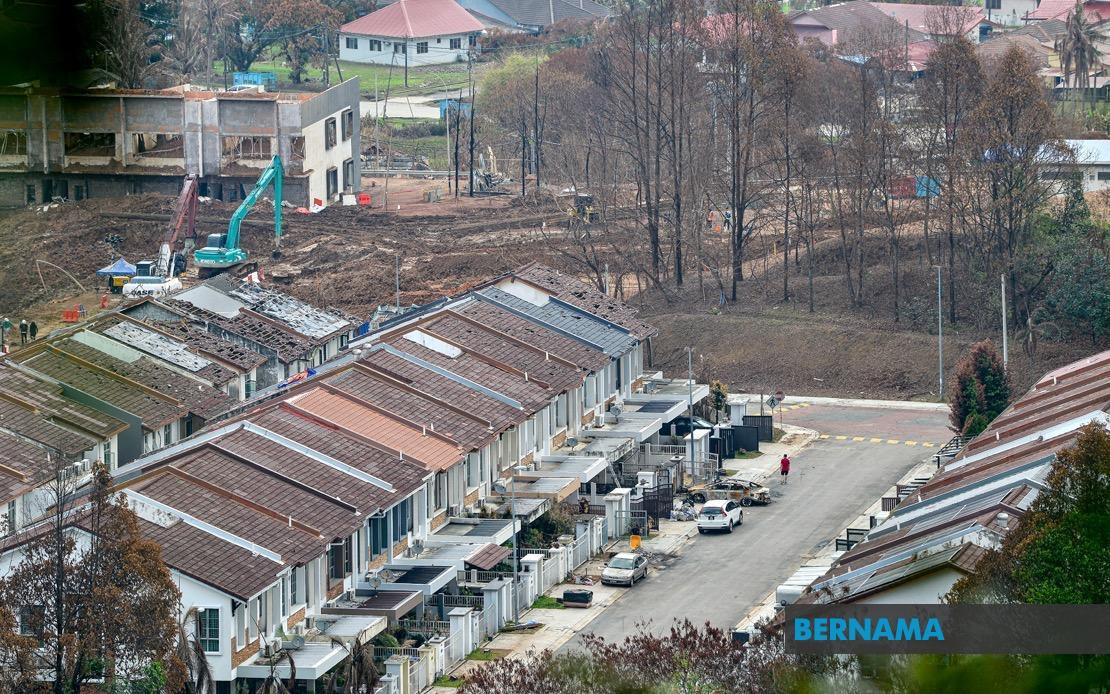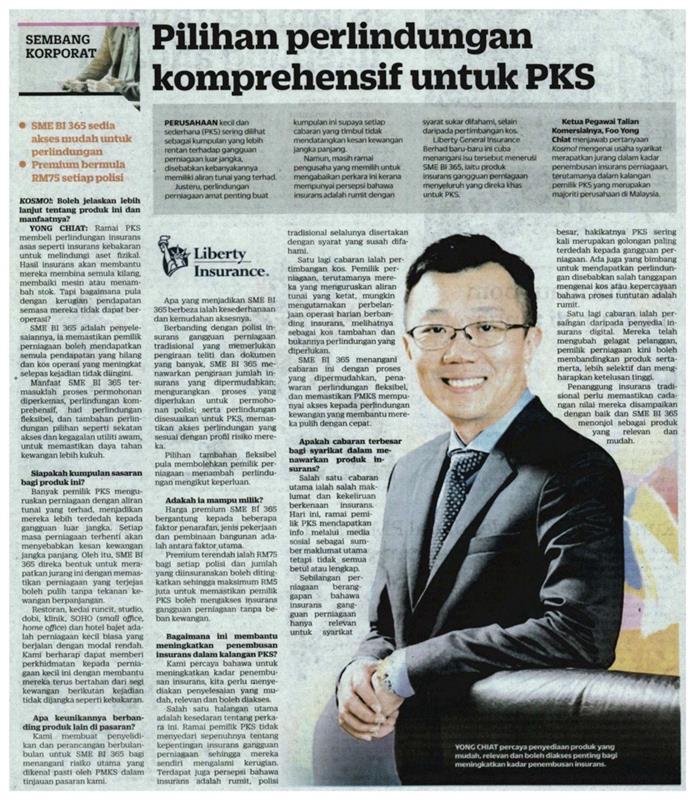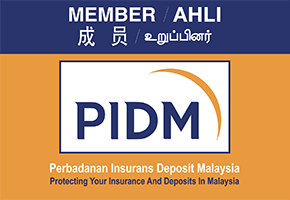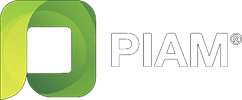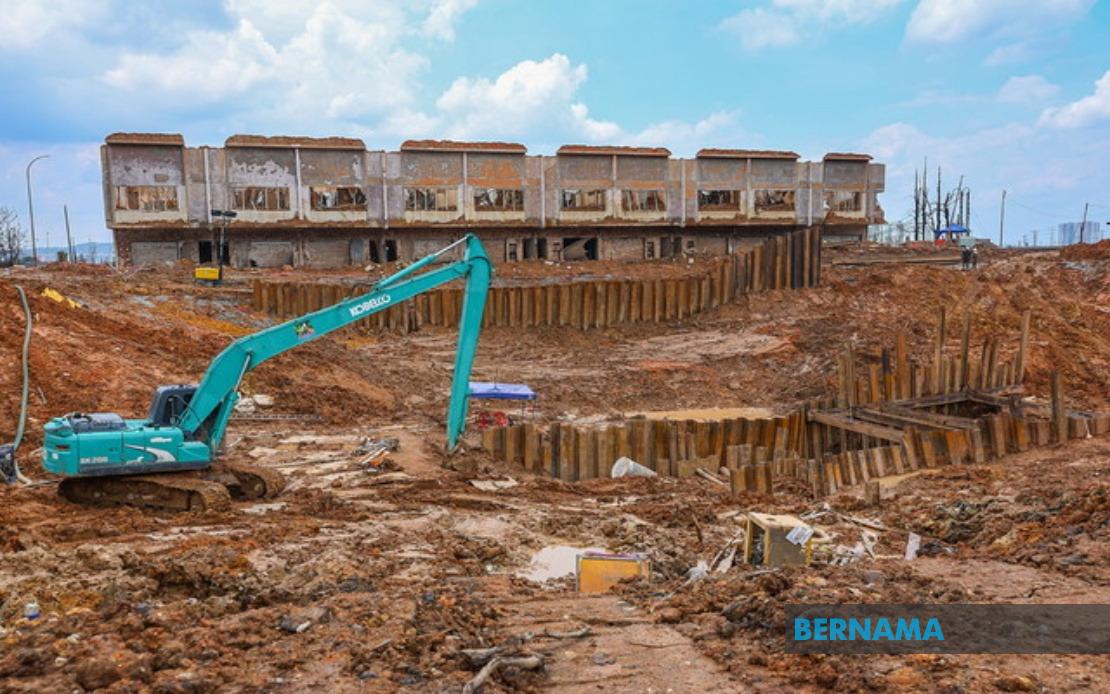
KUALA LUMPUR, June 25 (Bernama) -- It’s been about three months since the devastating gas pipeline explosion and fire at USJ Putra Heights. Fortunately, there were no fatalities. It shocked Malaysians. Questions are still being asked as to the compensation for damages to houses, properties, possessions and injuries sustained.
Puneet Pasricha (Pasha), the Chief Executive Officer of Liberty General Insurance Bhd, responds to questions posed by BERNAMA on the lessons to be learnt from the incident.They include such topics as homeowners’ and houseowner’s insurance policies, eligibility for claims, types of policies available in Malaysia to insure against property damage and related issues. Herewith the details of the responses in question-and-answer format.
1. What are the lessons to be learnt from homeowners affected by the pipeline explosion at Putra Heights. Are Malaysian homeowners sufficiently protected?
- The Putra Heights incident is a stark reminder of how unexpected disasters can cause devastating loss. It highlights the importance of adequate insurance protection—not just for vehicles, but also for homes and businesses. Sadly, it also exposes a harsh reality: many Malaysian homeowners are either underinsured or unaware of the extent of protection they truly need.
- There are a few factors that Malaysian homeowners need to be aware of:
- Potential Hazards: Homeowners need to be aware of the infrastructure surrounding their properties, including pipelines, power lines, and other utilities. While these types of incidents are rare, understanding potential risks is the first step towards preparedness.
- Comprehensive Insurance: There is now a critical need for broader coverage, as many affected homeowners may only have basic fire insurance which might not cover damages from explosions or related perils.
- Policy Scope: Homeowners should periodically review their insurance policies to ensure they adequately cover potential risks relevant to their location and circumstances.
- Emergency Preparedness: Having an emergency plan in place, including knowing evacuation routes, and having essential documents readily accessible, is crucial during unforeseen events.
2. What specific homeowners' household insurance policies are required before they can claim for damages?
- To be eligible for claims, homeowners must have either a Houseowner policy, which covers the structure of the building, or a Householder policy, which protects contents inside the home. Both are essential in providing full protection against events such as explosions, fires, and other crises.
- However, there needs to be greater awareness and adoption of more comprehensive policies. While basic fire insurance is relatively common due to mortgage requirements, comprehensive homeowner's insurance that covers a wider range of crises might not be as prevalent.
3. Can you provide some details of the various houseowners and householder insurance policies available in the Malaysian market? What about damage to condominium units in case of fire?
- The Malaysian insurance market offers various houseowners and householders insurance policies designed to protect against a range of risks.
- At Liberty General Insurance, our Houseowner policy covers:
- Disaster Relief: Covers the building against all natural perils including fire, lightning, windstorm, earthquake, and floods.
- Sudden Impact: Covers loss or damage to your building due to damages caused by aircrafts, road vehicles and animals, as well as domestic gas explosions.
- Unforeseen Perils: Protects your house against damages incurred by bursting or overflowing water tanks or pipes, theft or rental loss.
- Add on Benefits: Invest in additional protection against subsidence, landslip, riot, strike, malicious damage, and liabilities to third parties for accidents in your house.
- Regarding damage to condominium units in case of fire, the master building insurance policy held by the Management Corporation typically covers the structure of the entire building, including the external walls, roof, and common areas.
- However, individual unit owners usually need their own householder's insurance to cover the assets below, which Liberty General Insurance also offers:
- Furniture & Household Goods
- Electrical Appliances & Kitchen Equipment
- Clothing, Personal Effects & Valuables
- Add on Benefits for additional protection against damage to lock and keys, loss of cash, jewellery, gold & silver articles, breakage of mirror, fatal insurance, rental losses, public liability, and full theft
- It is crucial for condominium owners to understand the scope of the master policy and their own individual insurance needs.
4. Also, can you explain what are the components of the add-on’s protection for houses?
- Homeowners need to ensure adequate protection against a wider range of potential disasters. Consider more comprehensive policies with higher sum insured amounts and broader peril coverage.
- Add-on protection for houses can provide supplementary coverage beyond what is typically included in a standard houseowner's or householder's insurance policy. Common components of add-on protection include:
- All Risks Coverage: This provides broader protection against accidental loss or damage to the building and/or contents, except for specifically excluded perils.
- Natural Disasters Coverage: This can include protection against perils like floods, earthquakes, landslides, and windstorms, which are often excluded from standard policies. Given Malaysia's vulnerability to floods, this is a crucial add-on for many homeowners.
- Liability Coverage: This protects the homeowner against legal liability if someone is injured on their property.
- By opting for relevant add-ons, homeowners can tailor their insurance coverage to their specific needs and the risks they face.
5. Can you provide some details of the houseowner and householder insurance policies that you offer?
- At Liberty General Insurance, we aim to provide flexible and comprehensive solutions to meet the needs of Malaysian homeowners. Our key offerings for Houseowners include:
- Disaster Relief: Covers the building against all natural perils including fire, lightning, windstorm, earthquake and floods.
- Sudden Impact: Covers loss or damage to your building due to damages caused by aircrafts, road vehicles and animals, as well as domestic gas explosions.
- Unforeseen Perils: Protects your house against damages incurred by bursting or overflowing water tanks or pipes, theft or rental loss.
- Our policies also offer various add-on options to further enhance protection, such as protection against subsidence, landslip, riot, strike, malicious damage, and liabilities to third parties for accidents in your house.
- As for Householders, we cover:
- Furniture & Household Goods: Ensure that the heart of your home is always secure with a policy that covers your home’s furniture and goods.
- Electrical Appliances & Kitchen Equipment: Go ahead and splurge on that fancy coffee machine you always wanted, secure in the knowledge that your appliances are protected.
- Clothing, Personal Effects & Valuables: Your personal effects and valuables are a part of your persona, and are irreplaceable. Ensure they are protected at all times.
- Add on Benefits: Invest in additional protection against subsidence, landslip, riot, strike, malicious damage, and liabilities to third parties for accidents in your house.
6. What are the necessary procedures that need to be fulfilled before one can apply for damages such as in the gas explosion? Basically, what are the do’s and don’ts?
- In the unfortunate event of damage such as a gas explosion, here are some necessary procedures to follow before applying for insurance claims:
- Do's:
- Report the Incident: As soon as you are safe to do so, report the incident to the police and other authorities like the relevant gas company if it was a gas-related incident. Obtain a copy of the police report if possible.
- Notify Your Insurer Immediately: Contact Liberty General Insurance or your insurer as soon as possible to inform us about the incident. Provide us with initial details of what happened and the extent of the damage.
- Document the Damage: Take clear photographs and videos of all the damage to your property and belongings. This documentation will be crucial for the claims assessment process.
- Preserve Damaged Property: Keep damaged items for inspection. However, avoid making permanent repairs before our adjuster has had a chance to assess the damage, unless temporary repairs are necessary to prevent further loss—like covering a damaged roof to prevent rain damage.
- Cooperate with the Adjuster: Our appointed loss adjuster will visit your property to assess the damage. Provide them with all the necessary information and access they require.
- Keep Records of Expenses: If your policy covers additional living expenses, keep records of any necessary costs incurred due to being displaced from your home—including hotel bills and food expenses.
- Read Your Policy: Familiarise yourself with the terms and conditions of your insurance policy to understand your rights and obligations.
- Don'ts:
- Do Not Tamper with Evidence: Avoid moving or cleaning up the damaged area before taking photographs and before the adjuster's inspection, unless it's necessary for safety.
- Do Not Make Exaggerated Claims: Be honest and accurate in your claim. Exaggerating the extent of the damage or the value of lost items can jeopardise your claim.
- Do Not Delay Reporting: Delaying the notification to your insurer can complicate the claims process.
- Do Not Dispose of Damaged Items Prematurely: Keep damaged items until the adjuster has inspected them or advised you otherwise.
- Do Not Admit Liability: If the incident involves third-party damage or injury, do not admit liability. Refer all inquiries to your insurer.
- Do Not Make Permanent Repairs Without Authorisation: Unless it is for essential temporary measures, avoid making permanent repairs before the adjuster has assessed the damage and provided authorisation.
7. From industry statistics, how prevalent is houseowner or householder insurance in Malaysia? Is the sector underinsured?
- While a significant portion of homeowners with mortgages typically have basic fire insurance due to bank requirements, the penetration rate for comprehensive houseowner or householder policies that cover a wider range of perils is considerably lower.
- There have been reports that a majority of Malaysian homes are not even insured for perils like fire and flood.
- This could be due to a lack of awareness about the benefits of comprehensive coverage, the perception that such events are rare, and potentially the cost of premiums for more extensive policies.
8. Can you provide growth figures and what is the industry’s worth in Malaysia?
- According to GlobalData, a leading data and analytics company, Malaysia’s general insurance industry is forecast to grow at a compound annual growth rate (CAGR) of 7.8% from MYR22.6 billion in 2024 to MYR30.5 billion in 2028, in terms of direct written premiums (DWP), I believe the number will continue to grow as the recent events like the Putra Heights pipeline explosion have driven renewed interest and growth in houseowner and householder policy uptake.
9. Are insurance policy premium payments for insuring one’s house expensive in Malaysia? Can you provide some figures as to the costing? For example, what would it cost to insure an average 22 by 74 double-storey house in a housing estate in the Klang Valley?
- Insurance policy premium payments for insuring one's home in Malaysia can depend on individual financial circumstances and the extent of coverage sought.
- Generally, basic fire insurance premiums are relatively affordable, especially considering it is often a prerequisite for a mortgage. However, the cost of a more comprehensive houseowner's and householder's insurance policy, with broader peril coverage and higher sum insured amounts, will naturally be higher.
- To provide the exact cost for insuring an average house in a housing estate in the Klang Valley is difficult without knowing details like the sum of the building and contents, the type of coverage and any add-ons, the location, the age and condition of the home, and deductibles, which is the amount you pay out-of-pocket before the insurance kicks in.
- However, to give you a rough idea: For a standard double-storey house in the Klang Valley with a reasonable sum insured for the building (let’s say RM500,000) and contents (about RM100,000), a comprehensive homeowner's and householder's policy could potentially range from a few hundred to over a thousand Ringgit per year. Basic fire insurance for the building alone would likely be significantly less.
- That being said, it’s always best to get a personalised quotation from the insurance agent based on your specific property details and coverage needs.
10. Claims are typically based on the cost of reconstruction. What if the houses cannot be reconstructed due to excessive damage?
- Claims are typically based on the cost of reconstruction or repair up to the sum insured. If the houses cannot be reconstructed due to excessive damage, and the policy provides coverage on a reinstatement value basis, the insurance payout would aim to cover the cost of rebuilding a new house of similar size and specifications on the same site, subject to the policy's terms and the sum insured.
- However, if the policy is on an indemnity basis (which is less common for total loss of property), the payout would consider depreciation and the current market value of the property, which might be significantly less than the cost of a new building.
- It is crucial for homeowners to ensure their sum insured is adequate to cover the full cost of rebuilding in case of a total loss.
11. Do you take into account the appreciation of the value of the house in your insurance payout for damages?
- Whether the insurance payout for damages takes into account the appreciation of the value of the house depends on the terms of the policy and the basis of settlement.
- They are generally based on the reinstatement value, not the market value. Appreciation of property value doesn’t affect payouts unless the policyholder updates their coverage accordingly. It’s important to review your sum insured regularly to ensure it reflects current rebuilding costs.
12. In the gas explosion incident, you provided NCD (No Claim Discount) protection for all affected policyholders. How many policyholders were involved?
- The Putra Height pipeline explosion affected 9 households and a single commercial building under the Fire/Contractor All Risk coverage. In additional, approximately 30 vehicles were affected by the fire/heat, where some were extensively burnt.
- To support our Policyholders, for Motor Vehicle Insurance Claims, the Company has provided No Claim Discount (NCD) protection accordingly.
- Our intention was to provide immediate relief and support to all our policyholders in the affected area.
13. You warned customers to be wary of scams. How does this happen in insurance claims?
- Unfortunately, scams can occur in insurance claims, often targeting vulnerable individuals during times of distress. There are a few common scams to look out for:
- Fake Insurance Adjusters: Individuals may impersonate insurance adjusters from Liberty or other insurance companies, offering quick settlements or requesting personal information to process the claim. Legitimate adjusters will always carry proper identification and will not ask for payment from the policyholder for claim processing.
- Unsolicited Offers of Assistance: After a major event, individuals or companies might approach affected residents with unsolicited offers to handle their insurance claims for a fee. Some of these may be legitimate loss adjusters, but others could be scams looking to take a percentage of the settlement or even steal personal information. Policyholders have the right to appoint their own loss adjuster if they choose, but they should verify their credentials carefully.
- Pressure Tactics: Scammers might use high-pressure tactics to get policyholders to sign agreements or provide information quickly without fully understanding the terms. Always take the time to read documents carefully, never rush into signing anything, and when in doubt, consult your insurer directly.
- Requests for Upfront Payments: Legitimate insurance companies do not require policyholders to pay upfront fees to process a claim settlement. Any such request should be treated with suspicion.
- Phishing and Identity Theft: Scammers may try to obtain personal and financial information by posing as insurance companies or related entities through emails, phone calls, or text messages. This information can then be used for identity theft or other fraudulent activities.
- Always ask for and verify the identification of anyone claiming to be an insurance adjuster or representative. Contact Liberty directly to confirm their credentials.
Related News

